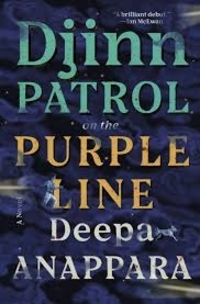Djinn Patrol on the Purple Line by Deepa Anappara
 Friday, February 7, 2020 at 6:54AM
Friday, February 7, 2020 at 6:54AM 
Published by Random House on February 4, 2020
Djinn Patrol on the Purple Line is a grim novel, but it uses humor to ease the pain that readers who empathize with the main characters will necessarily feel. Life is a mix of joy and sorrow; both are represented here.
Two boys and a girl have disappeared from a slum. The police, having no incentive to look for them, label them as runaways. Parents fear that they have been snatched and sold into slave labor or to harvesters of kidneys. Jai’s friend Faiz believes they have been stolen by a djinn. At age nine, Jai is prepared to believe all those theories. He also knows one of the missing boys.
Having watched countless episodes of Police Patrol, Jai decides to solve the case. He expects success to be rewarded with a career as a detective (jasoos). His house is the present headquarters of the Jasoos Jai Agency, but only when Runu, his elder sister, is not present to break up the meetings he holds with his assistants, Faiz and Pari. Runu is a track star, although running track is her own version of running away. Eventually other children go missing, including two Muslim kids, sending the basti residents into a justified panic.
While calling attention to trafficking and forced labor of children in India, Deepa Anappara also focuses on other problems: divisions of religion and caste, nationalism, sexism, corruption, poverty, and judgmental gossip. The first girl who went missing is rumored to have worked in a brothel. Cheating wives and abusive husbands are among those who “disassemble her character with the viciousness of starved dogs chancing upon a scrawny bird.” They condemn her because her skirts are too short and she has been seen chatting with a Muslim boy, proof of her “utter moral failure.” The absence of evidence that she is a brothel worker does not discourage the gossip. Some people, Anappara suggests, enjoy the misfortune of others if it gives them an opportunity to gossip and condemn.
Other examples of hypocrisy fuel Anappara’s humor. It is widely believed that djinns have taken over an abandoned palace, but Hindus, Sikhs, Christians, and “maybe even Buddhists” join Muslims in leaving letters at the palace, filled with wishes they hope the djinns will grant. Some of the politicians “who became Union ministers only because they called us Muslims foreigners,” who “holler during rallies that Hindustan is only for Hindus, and that [Muslims] should go to Pakistan” sneak into the palace to leave their entreaties, first making sure no cameras can take pictures of them bowing to the djinns. Superstition has created the only place where all people are equal.
Jai’s family and other residents of the basti live in fear that the police will bring bulldozers and knock down their homes. They make regular payments to the police to keep their homes intact, but any trouble might provoke unwanted attention, spurring the government to demolish the slum. The police accept bribes to look for missing children but their only interest lies in protecting their own jobs, which means protecting the powerful. Jai’s father pretends not to worry because “Our basti has been here for years. We have identity cards, we have rights. We’re not Bangladeshis.” His mother argues that they only have rights two weeks before an election, the only time politicians pay attention to them.
The plot invites fear that Jai’s sister has been snatched, perhaps to avenge the beheading of a revered buffalo that lived in an alley near their home. Uncertainty about the fate of a missing child might be worse than certainty that the child is lost forever. Suspects are plentiful, as suspicion falls on anyone who has earned resentment, from bullies in the basti to prosperous hi-fi people who live in high-rise buildings, employing basti residents as servants.
In a sense, Djinn Patrol is a coming-of-age-early novel. Jai plays at being a detective, imagining he can use the skills he gleans from Police Patrol, but his imagination gives way to the harshness of reality by the time the story ends. He recognizes that crime reenactments are not stories, that losses viewed on television are not the same as losses experienced. He is not old enough to understand the words he hears from an older resident — the lucky are those who “grow old pretending they have some control over their lives, but even they will realize at some point that everything is uncertain, bound to disappear forever” — but it seems certain he will internalize the lesson.
Jai is a memorable character at the heart of a powerful story. The slow transition from humor to grim realism reminds readers that life is never as simple as we might wish it to be, and that it is wrong to turn away from the misfortune of others because they live in a different place, belong to a different religion, or live an impoverished life that they did not choose.
RECOMMENDED